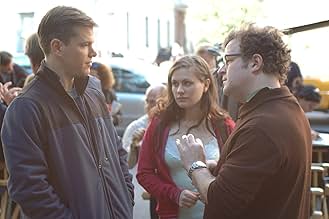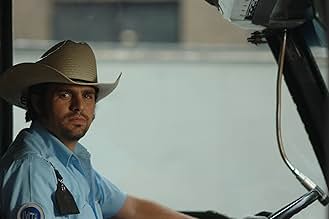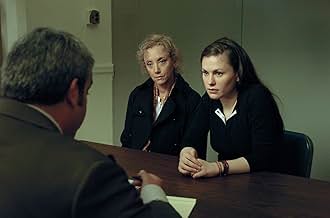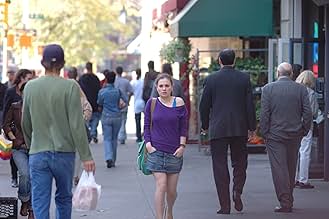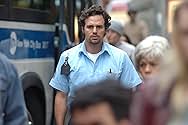IMDb रेटिंग
6.5/10
19 हज़ार
आपकी रेटिंग
एक युवा महिला एक बस दुर्घटना की गवाह बनती है, और उसके बाद की परिस्थितियों में उलझ जाती है, जहा सवाल ये है की वह दुर्घटना जान बुझ कर की गई या नहीं, जिससे कई लोगो का जीवन प्रभावित होता है.एक युवा महिला एक बस दुर्घटना की गवाह बनती है, और उसके बाद की परिस्थितियों में उलझ जाती है, जहा सवाल ये है की वह दुर्घटना जान बुझ कर की गई या नहीं, जिससे कई लोगो का जीवन प्रभावित होता है.एक युवा महिला एक बस दुर्घटना की गवाह बनती है, और उसके बाद की परिस्थितियों में उलझ जाती है, जहा सवाल ये है की वह दुर्घटना जान बुझ कर की गई या नहीं, जिससे कई लोगो का जीवन प्रभावित होता है.
- पुरस्कार
- 10 जीत और कुल 18 नामांकन
फ़ीचर्ड समीक्षाएं
Margaret (2011)
A terrific, evolving, and in-obvious story line mixed with a lead performance by Anna Paquin to die for makes "Margaret" fabulous. See it for her performance alone.
If you think this is a new movie you'll notice some famous actors who look rather young--Matt Damon in particular in his role as a likable high school teacher. That's because it was filmed in 2005 (and got held up in post-production). Even so it doesn't feel dated. The main themes hold up really well, and are told with unusually frank terms. Many people really are just greedy and selfish at heart.
The key event happens early on and in a way can't even be mentioned here. But it's safe to say that Paquin, who's character is called Lisa Cohen, at first takes a false stance in a moment of crisis and compassion. But the truth of the matter eats at her, and against the rising tide of people who prefer the lie she becomes increasingly principled. In the end it is almost everyone who is morally corrupt, even in his own way her teacher.
There is one lurking problem to the movie that really hurt it. One is the way the initial crisis is filmed (with Mark Ruffalo as a bus driver). It is exaggerated and makes the circumstances leading to tragedy unlikely just when the rest of the movie depends on likelihood. Since this is the lynchpin of everyone's reactions later on, it matters rather too much to ignore.
But the rest of it, from the main plot and Paquin to the various sub-plots including a romantic affair her mother has and some political conflicts about Arab-Israeli relations and the 9/11 events, is all really sharply delineated and well acted. And it's written with a good ear for dialog. It simply makes sense. The fact that there is no silver lining here, and that people are shown so obviously ugly below the surface, is harder to do than you might think. All admirable stuff.
A terrific, evolving, and in-obvious story line mixed with a lead performance by Anna Paquin to die for makes "Margaret" fabulous. See it for her performance alone.
If you think this is a new movie you'll notice some famous actors who look rather young--Matt Damon in particular in his role as a likable high school teacher. That's because it was filmed in 2005 (and got held up in post-production). Even so it doesn't feel dated. The main themes hold up really well, and are told with unusually frank terms. Many people really are just greedy and selfish at heart.
The key event happens early on and in a way can't even be mentioned here. But it's safe to say that Paquin, who's character is called Lisa Cohen, at first takes a false stance in a moment of crisis and compassion. But the truth of the matter eats at her, and against the rising tide of people who prefer the lie she becomes increasingly principled. In the end it is almost everyone who is morally corrupt, even in his own way her teacher.
There is one lurking problem to the movie that really hurt it. One is the way the initial crisis is filmed (with Mark Ruffalo as a bus driver). It is exaggerated and makes the circumstances leading to tragedy unlikely just when the rest of the movie depends on likelihood. Since this is the lynchpin of everyone's reactions later on, it matters rather too much to ignore.
But the rest of it, from the main plot and Paquin to the various sub-plots including a romantic affair her mother has and some political conflicts about Arab-Israeli relations and the 9/11 events, is all really sharply delineated and well acted. And it's written with a good ear for dialog. It simply makes sense. The fact that there is no silver lining here, and that people are shown so obviously ugly below the surface, is harder to do than you might think. All admirable stuff.
This is the Theatrical Cut...What to say of the film? I definitely enjoyed it at times, and it had some powerful scenes and acting. Paquin in particular has some very impressive moments, and the characters here are all interesting. It's hard to really grasp the characterization at times, and the melodramatic moods that go along with the different plot lines make for a very interesting, very unique, spin. The film is never flat out dull, and there's always a hint of genius behind it all, but ultimately it feels like a structurally messy composition of story lines. It's a very odd, inconsistent film, and even Paquin's portrayal and character is hard to wrap your finger around. Like I said, there are moments of brilliance, but also scenes that I didn't care for at all and scenes that left me feeling nothing other than confusion as to why they were there. I get the impression that the writer/director is really trying something here, and sometimes it felt like he succeeded, but as a film there's one too many flaws. The editing is rather distracting, and while it worked at times there's no reason why it shouldn't have been much better in certain moments. Scenes come and go without any particular flow, and it really hurts the film.
Ultimately, this is a frustrating, uneven, incohesive film with inconsistent characters and a pretty great, but again inconsistent, main performance by Anna Paquin. Don't be fooled, there are great moments sprinkled in here, and Lisa's classroom scenes really resonate, but it's just not enough to recommend. I wish I actually wanted to seek out the Extended Cut, but I really don't. I know many people will read this and say I "didn't get it" and that's fine since it works both ways for all film buffs, but I'm not a fan, and the more I think about it the less I like it. At least it's not boring.
Ultimately, this is a frustrating, uneven, incohesive film with inconsistent characters and a pretty great, but again inconsistent, main performance by Anna Paquin. Don't be fooled, there are great moments sprinkled in here, and Lisa's classroom scenes really resonate, but it's just not enough to recommend. I wish I actually wanted to seek out the Extended Cut, but I really don't. I know many people will read this and say I "didn't get it" and that's fine since it works both ways for all film buffs, but I'm not a fan, and the more I think about it the less I like it. At least it's not boring.
On the day of its cinema release, Kenneth Lonergan's long-gestating drama was the most successful film in the UK. Problem was, it only opened on one screen. The story of Margaret's production is likely a fascinating story in itself, not least because of Martin Scorsese and Thelma Schoonmaker's input into the final edit, which was presumably a return favour for Lonergan's work on the screenplay for Gangs of New York. But I'll focus on the fascinating story that Lonergan has told with this film.
Ostensibly the tale centres on a New York schoolgirl named Lisa (Anna Paquin, defining her young adulthood just as she defined herself in childhood with The Piano), who inadvertently causes a fatal road accident. What follows is the emotional aftermath, fought outwardly with her mother, as a moral and ethical war wages within her hormone-ravaged body.
The performances are excellent throughout, particularly Paquin and J. Smith-Cameron as the daughter and mother caught in gravitational flux. Jean Reno gives fine support as the sad-sack Ramon, while Matthew Broderick delivers the poem (by Gerard Manley Hopkins) that provides the film's title, while suggesting the entire life of his character by the way he eats a sandwich. It's that kind of film.
I recently wrote a review of Winter's Bone, which I described as an anti-youth movie. Margaret could be a companion piece in this regard, cautioning against the bright-eyed naivety of youthful independence, and promoting the importance of family. Like Winter's Ree, Lisa is a lost soul; unlike Ree, Lisa is not someone we admire. But she is always in focus; Lonergan expects not for us to like her, only to understand her. In maintaining this focus, Lonergan himself achieves the admirable: weaving a narrative whose minute details and labyrinthine arguments mirror the broader existential vista against which they are dwarfed.
Margaret goes deeper than Winter's Bone, delivering something pleasingly unexpected: a kind of Sartrean modern fable about the isolating nature of subjectivity. Like her actor mother on the stage, and like us all in our semi-waking lives, Lisa is the main player in her great opera. She performs the social functions that enable her to cling to a sense of belongingness, but something gnaws at her soul. And when, after the accident, she seeks some kind of meaning, she is met at once by indifference, before being seduced by those very institutions that make indifference normal. Nothing in the material world satisfies Lisa; nothing can match her aspirations. The suggestion here, I feel, is that our despair emerges from the disparity between that which we hope for and that which reality can deliver.
No wonder it took so long to find its way to a single UK screen: a three-hour existentialist play is a tough sell. Ten years after the towers sank to Ground Zero, Margaret joins There Will Be Blood, The Assassination of Richard Nixon, and (for some) Zodiac in the pantheon of modern classics that map the American psyche in the post-9/11 world.
Ostensibly the tale centres on a New York schoolgirl named Lisa (Anna Paquin, defining her young adulthood just as she defined herself in childhood with The Piano), who inadvertently causes a fatal road accident. What follows is the emotional aftermath, fought outwardly with her mother, as a moral and ethical war wages within her hormone-ravaged body.
The performances are excellent throughout, particularly Paquin and J. Smith-Cameron as the daughter and mother caught in gravitational flux. Jean Reno gives fine support as the sad-sack Ramon, while Matthew Broderick delivers the poem (by Gerard Manley Hopkins) that provides the film's title, while suggesting the entire life of his character by the way he eats a sandwich. It's that kind of film.
I recently wrote a review of Winter's Bone, which I described as an anti-youth movie. Margaret could be a companion piece in this regard, cautioning against the bright-eyed naivety of youthful independence, and promoting the importance of family. Like Winter's Ree, Lisa is a lost soul; unlike Ree, Lisa is not someone we admire. But she is always in focus; Lonergan expects not for us to like her, only to understand her. In maintaining this focus, Lonergan himself achieves the admirable: weaving a narrative whose minute details and labyrinthine arguments mirror the broader existential vista against which they are dwarfed.
Margaret goes deeper than Winter's Bone, delivering something pleasingly unexpected: a kind of Sartrean modern fable about the isolating nature of subjectivity. Like her actor mother on the stage, and like us all in our semi-waking lives, Lisa is the main player in her great opera. She performs the social functions that enable her to cling to a sense of belongingness, but something gnaws at her soul. And when, after the accident, she seeks some kind of meaning, she is met at once by indifference, before being seduced by those very institutions that make indifference normal. Nothing in the material world satisfies Lisa; nothing can match her aspirations. The suggestion here, I feel, is that our despair emerges from the disparity between that which we hope for and that which reality can deliver.
No wonder it took so long to find its way to a single UK screen: a three-hour existentialist play is a tough sell. Ten years after the towers sank to Ground Zero, Margaret joins There Will Be Blood, The Assassination of Richard Nixon, and (for some) Zodiac in the pantheon of modern classics that map the American psyche in the post-9/11 world.
Margaret – CATCH IT (B+) Margaret is very interesting movie about a teenage girl partially involved in woman death in a brutal accident. The movie deals with how she is wants the bus driver to at least accept his mistake too and have some remorse or gilt. The movie takes to her journey how she tries to deal with her conscious. She is now torn apart with frustration and begins to emotionally brutalizing her family, her friends, her teachers, and most of all, herself. Anna Paquin's performance as Margaret is terrific. She literally lived the role. From start to finish you won't be able to take your eyes off her, she may now always be remembered as Sookie Stackhouse but here she shows how incredible emotional range she has as an artist. Alison Janney is her death sequence was amazing. It maybe was a 5mintse scene but she sold her death to us and we can now imagine why Lisa was so heartbroken because of her death. J.Smith-Cameron is superb as Lisa's mom. Mark Ruffalo, Matt Damon, John Gallager JR, Kieran Culkin, Rosemarie DeWitt, Jene Rene and Matthew Broderick did a decent job in their respective small yet pivotal roles. In the end Margaret is a nice movie and only flaw it has is its incredibly long without any reason. The movie could have been easily cut into hour and half by eliminating extra scenes or views of New York City.
"Margaret" took years to get to us, seemingly even longer to play out, but tells a story so poetic and heartbreakingly real that you couldn't imagine it any other way. Lisa (Anna Paquin) is a teenager; she's lost in her own world by her own misguided arrogance, but she must come to terms with death and the true nature of a tragic accident.
The film starts with Lisa in high school determinedly getting her way even though she probably doesn't deserve to. Nonchalantly waiting 'til class is over and wearing a skirt too short, she saunters her way to the front where her math teacher, Mr. Aaron (Matt Damon), chastises her for her poor grades. But with a slightly flirtatious tone, Lisa settles the matter with a supposedly shared understanding that it's okay because math won't factor into her future.
Later, Lisa sets out to find a stylish but functional cowboy hat in the middle of New York City. She is unsuccessful until she spies one on the head of a boyishly handsome bus driver (Mark Ruffalo) and jauntily jogs beside it determined to get his attention to both: find out where he got his hat; and also to quench a teenage girl's desire of just getting his attention. She succeeds; he drives through a red light, and kills a pedestrian in the process.
Lisa immediately feels the pain, guilt and remorse and tries to ease the woman's passage into the afterlife. The film then becomes a character study of a teenage girl determined to get past the pain and aftermath of a tragedy caused by a simple accident. The fascinating parts of this film involve how our lead character becomes less sympathetic but more fragile while remaining equally reckless.
Questions about the cause and nature of mortality are raised, and most interestingly what are the moral and immoral ways to respond to it. The film's title comes from the poem "Spring and Fall: (Margaret, Are You Grieving?)" written by Gerard Manley Hopkins in 1880. Margaret is a child who must come to terms with the loss of her innocence. " And yet you will weep and know why. Now no matter, child, the name; Sorrow's springs are the same." Lisa's English teacher (Matthew Broderick) recites this poem to the class. Lisa is, at times, a typical teenager, bent on having things her way, always having her point heard. But now the shaky foundations which her arrogance is based on begin to crumble and we don't know and she doesn't know if she's still innocent or where she lost it.
The shortened released version of "Margaret" clocks in at over two and a half hours; edited down from the three-hour director's cut. But because of the universal tale of life and death that it tells, it needs the length. It doesn't have a simple plot, and Lisa is not a simple character. It can definitely seem errant with its uneven editing, but that's probably going to be an expected outcome of 6 years' worth of legal and creative battles going on behind the scenes.
Broderick and Ruffalo re-team from Lonergan's previous indie success "You Can Count on Me" (2000), but don't expect any actor to show more range or emotion than Anna Paquin. Everything goes through Lisa.
The film starts with Lisa in high school determinedly getting her way even though she probably doesn't deserve to. Nonchalantly waiting 'til class is over and wearing a skirt too short, she saunters her way to the front where her math teacher, Mr. Aaron (Matt Damon), chastises her for her poor grades. But with a slightly flirtatious tone, Lisa settles the matter with a supposedly shared understanding that it's okay because math won't factor into her future.
Later, Lisa sets out to find a stylish but functional cowboy hat in the middle of New York City. She is unsuccessful until she spies one on the head of a boyishly handsome bus driver (Mark Ruffalo) and jauntily jogs beside it determined to get his attention to both: find out where he got his hat; and also to quench a teenage girl's desire of just getting his attention. She succeeds; he drives through a red light, and kills a pedestrian in the process.
Lisa immediately feels the pain, guilt and remorse and tries to ease the woman's passage into the afterlife. The film then becomes a character study of a teenage girl determined to get past the pain and aftermath of a tragedy caused by a simple accident. The fascinating parts of this film involve how our lead character becomes less sympathetic but more fragile while remaining equally reckless.
Questions about the cause and nature of mortality are raised, and most interestingly what are the moral and immoral ways to respond to it. The film's title comes from the poem "Spring and Fall: (Margaret, Are You Grieving?)" written by Gerard Manley Hopkins in 1880. Margaret is a child who must come to terms with the loss of her innocence. " And yet you will weep and know why. Now no matter, child, the name; Sorrow's springs are the same." Lisa's English teacher (Matthew Broderick) recites this poem to the class. Lisa is, at times, a typical teenager, bent on having things her way, always having her point heard. But now the shaky foundations which her arrogance is based on begin to crumble and we don't know and she doesn't know if she's still innocent or where she lost it.
The shortened released version of "Margaret" clocks in at over two and a half hours; edited down from the three-hour director's cut. But because of the universal tale of life and death that it tells, it needs the length. It doesn't have a simple plot, and Lisa is not a simple character. It can definitely seem errant with its uneven editing, but that's probably going to be an expected outcome of 6 years' worth of legal and creative battles going on behind the scenes.
Broderick and Ruffalo re-team from Lonergan's previous indie success "You Can Count on Me" (2000), but don't expect any actor to show more range or emotion than Anna Paquin. Everything goes through Lisa.
क्या आपको पता है
- ट्रिवियाOriginally scheduled for release in 2007, but writer/director Kenneth Lonergan spent four more years struggling with Fox Searchlight Pictures over the final cut, resulting in several lawsuits.
- गूफ़When Lisa comes home after the accident, throws up and hugs her mother, there's no blood on her arms and hands. In the next shots under the shower, there is plenty.
- इसके अलावा अन्य वर्जनExtended version released on DVD runs for 178 minutes.
- कनेक्शनFeatured in Maltin on Movies: Ice Age: Continental Drift (2012)
टॉप पसंद
रेटिंग देने के लिए साइन-इन करें और वैयक्तिकृत सुझावों के लिए वॉचलिस्ट करें
विवरण
बॉक्स ऑफ़िस
- बजट
- $1,40,00,000(अनुमानित)
- US और कनाडा में सकल
- $46,495
- US और कनाडा में पहले सप्ताह में कुल कमाई
- $7,525
- 2 अक्टू॰ 2011
- दुनिया भर में सकल
- $4,69,264
- चलने की अवधि2 घंटे 30 मिनट
- रंग
- ध्वनि मिश्रण
- पक्ष अनुपात
- 1.85 : 1
इस पेज में योगदान दें
किसी बदलाव का सुझाव दें या अनुपलब्ध कॉन्टेंट जोड़ें




